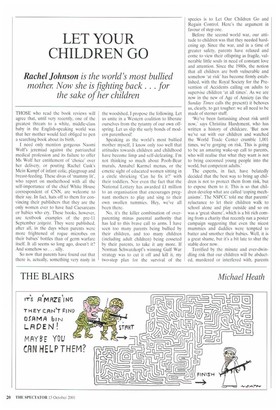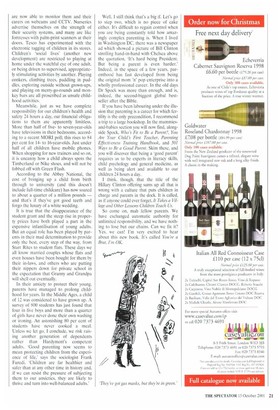LET YOUR CHILDREN GO
Rachel Johnson is the world's most bullied
mother Now she is fighting back. . . for the sake of her children
THOSE who read the book reviews will agree that, until very recently, one of the greatest threats to a white, middle-class baby in the English-speaking world was that her mother would feel obliged to pen a searching book about its birth.
I need only mention gorgeous Naomi Wolf s jeremiad against the patriarchal medical profession and its failure to offer Ms Wolf her entitlement of 'choice' over her delivery, or pouting Rachel Cusk's Mein Kampf of infant colic, playgroup and breast-feeding. These divas of 'mummy lit', who report on motherhood with all the self-importance of the chief White House correspondent of CNN, are welcome to their say. In fact, hats off to them for convincing their publishers that they are the only women ever to have had Caesareans or babies who cry. These books, however, are textbook examples of the pre-H September zeitgeist. They were published, after all, in the days when parents were more frightened of rogue microbes on their babies' bottles than of germ warfare itself. It all seems so long ago, doesn't it? And somehow so ... silly.
So now that parents have found out that there is, actually, something very nasty in the woodshed, I propose the following. Let us unite in a Western coalition to liberate ourselves from the tyranny of our own offspring. Let us slip the surly bonds of modern parenthood?
Speaking as the world's most bullied mother myself, I know only too well that attitudes towards children and childhood have become limp and self-defeating. I'm not thinking so much about Pooh-Bear murals, Annabel Karmel menus, or the emetic sight of educated women sitting in a circle shrieking 'Can he fix it?' with their toddlers. Nor even the fact that the National Lottery has awarded £1 million to an organisation that encourages pregnant mothers to play and sing to their own swollen tummies. Hey, we've all been there.
No, it's the killer combination of overparenting minus parental authority that has led to this brave call to arms. I have seen too many parents being bullied by their children, and too many children (including adult children) being cosseted by their parents, to take it any more. If Norman Schwarzkopfs winning Gulf War strategy was to cut it off and kill it, my two-step plan for the survival of the species is to Let Our Children Go and Regain Control. Here's the argument in favour of step one.
Before the second world war, our attitude to children was that they needed hardening up. Since the war, and in a time of greater safety, parents have relaxed and come to view their offspring as fragile, vulnerable little souls in need of constant love and attention. Since the 1980s, the notion that all children are both vulnerable and somehow 'at risk' has become firmly established, with the Royal Society for the Prevention of Accidents calling on adults to supervise children 'at all times'. As we are now in the new of Age of Anxiety (as the Sunday Times calls the present) it behoves us, clearly, to get tougher: we all need to be made of sterner stuff.
'We've been fantasising about risk until now,' says Christina Hardyment, who has written a history of childcare. 'But now we've sat with our children and watched the World Trade Center crumble 1,001 times, we're gorging on risk. This is going to be an amazing wake-up call to parents, who will realise that what they want is not to bring cocooned young people into the world, but competent adults.'
The experts, in fact, have belatedly decided that the best way to bring up children is not to protect them from risk, but to expose them to it. This is so that children develop what are called 'coping mechanisms'. The NSPCC told me that parents' reluctance to let their children walk to school alone and play outside and so on was a 'great shame', which is a bit rich coming from a charity that recently ran a poster campaign suggesting that even the nicest mummies and daddies were tempted to batter and smother their babies. Well, it is a great shame, but it's a bit late to shut the stable door now.
Terrified by the minute and ever-dwindling risk that our children will be abducted, murdered or interfered with. parents are now able to monitor them and their carers on webcams and CCTV. Nurseries advertise themselves on the strength of their security systems, and many are like fortresses with palm-print scanners at their doors. Tesco has experimented with the electronic tagging of children in its stores. Children's 'social lives' (another new development) are restricted to playing at home under the watchful eye of one adult, or being driven to supervised, appropriately stimulating activities by another. Playing conkers, climbing trees, paddling in puddles, exploring outside without grown-ups, and playing on merry-go-rounds and monkey bars are all proscribed as unsafe childhood activities.
Meanwhile, just as we have complete responsibility for our children's health and safety 24 hours a day, our financial obligations to them are apparently limitless. More than half of fiveto seven-year-olds have televisions in their bedrooms, according to a recent MORI poll; this rises to 84 per cent for 14to 16-year-olds. Just under half of all children have mobile phones. When shopping for new trainers and so on, it is uncanny how a child always spots the Timberland or Nike shoes, and will not be fobbed off with Green Flash.
According to the Abbey National, the cost of bringing up a child from birth through to university (and this doesn't include full-time childcare) has now soared to about a quarter of a million pounds — and that's if they've got good teeth and forgo the luxury of a white wedding.
It is true that the disappearance of the student grant and the steep rise in property prices have both played a part in the expensive infantilisation of young adults. But an equal role has been played by parents in their mad determination to provide only the best, every step of the way, from Start Rites to student flats. These days we all know married couples whose flats and even houses have been bought for them by their in-laws, and others who are putting their nippers down for private school in the expectation that Granny and Grandpa will shell out eventually.
In their anxiety to protect their young, parents have managed to prolong childhood for years. In the Middle Ages, a child of 12 was considered to have grown up. A survey of 800 students has just found that four in five boys and more than a quarter of girls haN,e never done their own washing or ironing. An astonishing 80 per cent of students have never cooked a meal. Unless we let go, I conclude, we risk raising another generation of dependents rather than flardyment's competent adults, 'Good parenting now seems to mean protecting children from the experience of life,' says the sociologist Frank Furedi, 'Children are far healthier and safer than at any other time in history and, if we can resist the pressure of subjecting them to our anxieties, they are likely to thrive and turn into well-balanced adults.'
Well. I still think that's a big if. Let's go to step two, which is no piece of cake either. It's difficult to regain control when you are being constantly told how amazingly complex parenting is. When I lived in Washington DC, there was a newspaper ad which showed a picture of Bill Clinton strolling hand-in-hand with Chelsea above the quotation, 'It's hard being President. But being a parent is even harder.' Indeed, in the space of a few years, parenthood has fast developed from being the original mom 'n' pop enterprise into a wholly professional career. In the old days Dr Spock was more than enough, and is, indeed, the second-biggest global bestseller after the Bible.
If you have been labouring under the illusion that parenting is a career for which fertility is the only precondition, I recommend a trip to a large bookshop. In the mummiesand-babies section you will now find, alongside Spock, Who's Fit to Be a Parent?, You Are Your Child's First Teacher, Parenting Effectiveness Training Handbook, and 501 Ways to Be a Good Parent. Skim these, and you will discover that being a 'good parent' requires us to be experts in literacy skills, child psychology and general medicine, as well as being alert and available to our children 24 hours a day.
I think, though, that the title of the Hillary Clinton offering sums up all that is wrong with a culture that puts children in charge and parents in the dock. It is called, as if anyone could ever forget, It Takes a Village and Other Lessons Children Teach Us.
So come on, mah fellow parents. We have exchanged automatic authority for unlimited responsibility, and we have nothing to lose but our chains. Can we fix it? Yes, we can! I'm very excited to hear about this new book. It's called You're a Brat, im OK.



























































































 Previous page
Previous page